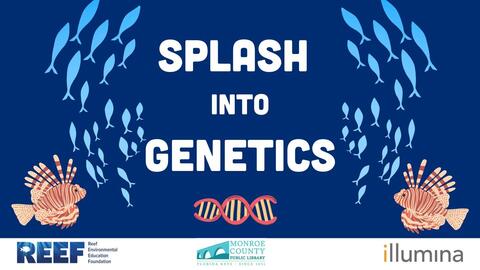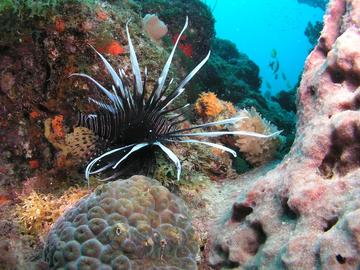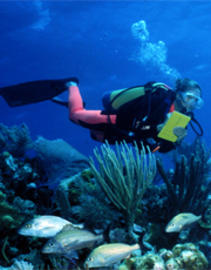As an environmental leader in our Florida Keys community, we are excited to share that REEF is taking a big step toward sustainability by making improvements to our Headquarters in Key Largo. You can help us reduce our carbon footprint by making a one-time, tax-deductible donation to support renewable energy.
Current search
Search found 422 items
- INVASIVE
The Conservation Challenge is a fun way to get involved in marine conservation and citizen science. You can earn collectible stickers by participating in various REEF programs and events! There are some great opportunities coming up this fall to earn different Conservation Challenge stickers, including:
Join REEF at the Public Library as we dive into what conservation genetics is and how it can help us combat difficult ecological problems like invasive species! After a brief presentation, participants are welcome to take part in extracting DNA from a strawberry and see how we can use DNA to find out what invasive lionfish are eating.
Presented by Annika Olson, REEF Marine Conservation Intern
As the spread and impact of the invasive Indo-Pacific red lionfish explodes in the western Atlantic region, REEF continues to take a lead in addressing this complex environmental issue. In addition to extensive outreach and education efforts, REEF staff is involved in several field research projects to study the ecological impact of this voracious predator. REEF is also coordinating regional response efforts. In partnership with the International Coral Reef Initiative (ICRI), NOAA, Mexico and France, REEF helped fund and organize the first Regional Lionfish Strategy Workshop in August.
$2,620 per person double occupancy. Includes: lodging for 7 nights onboard the Aqua Cat luxury liveaboard in an ocean view cabin, all meals and drinks, up to 5 dives per day for 6 days and 2 dives on the last day of diving, and r/t ground transportation from Nassau Airport.
+$200 REEF Program Fee per diver will be added to each package to cover the cost of the group leader, seminar and survey materials.
Last week, representatives from the Florida House and Senate took the first steps in banning the importation or aquaculture of invasive lionfish. Representative Holly Raschein (R-Key Largo) and Senator Greg Evers (R- Pensacola) have filed HB 1069 and SB 1336 to address the devastation being caused by lionfish in Florida’s coastal waters. The bills will prohibit importation, aquaculture and sale of illegally imported lionfish and they authorized FWC to adopt a rule to that effect.
CRF AND REEF HOST SUCCESSFUL FIRST-EVER "CORALS IN & LIONFISH OUT"
More than $1,000.00 raised to support marine conservation in the Florida Keys
The Coral Restoration Foundation (CRF) and Reef Environmental Education Foundation (REEF) teamed up during the second week of September for “Corals In and Lionfish Out,” a series of events to engage and educate the public while raising funds for coral restoration and invasive lionfish removal efforts in the Florida Keys.
REEF's Volunteer Fish Survey Project (fish surveys) and Invasive Species Program (invasive lionfish removals and derbies) are highlighted in this article about ways to participate in citizen science as a diver in the Florida Keys.
Every month, scientists, government agencies, and other groups request raw data from REEF’s Fish Survey Project database. Here is a sampling of who has asked for REEF data recently and what they are using it for:
- Researchers at the World Resources Institute are using western Atlantic REEF data in an analysis of threats to the world’s coral reefs called Reefs at Risk Revisited.
- A scientist from Washington Department of Fish and Wildlife is evaluating population trends of rock scallop in preparation for harvest rule updates.





